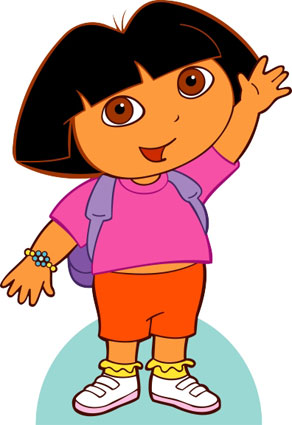Dora’s Disappointing Makeover
Posted on March 7, 2009 at 4:00 pm
Here is the opening paragraph of a new press release:
Mattel, Inc. (NYSE:MAT) and Nickelodeon/Viacom Consumer Products (NVCP), announced today that Dora the Explorer™ is growing up! The companies have introduced a whole new way to look at Dora for girls five years and up. This groundbreaking initiative, featuring fashion dolls and accessories, is a completely new brand extension that empowers girls to influence and change the lives of Dora and her new friends. It’s innovative, diverse, wholesome, bi-lingual and entertaining.
“A whole new way to look at Dora” and “a completely new brand extension” both translate to “more things for us to sell,” of course. And my heart sinks to hear of plucky little Dora being turned into a “brand extension” “featuring fashion dolls and accessories.” So Dora is going to turn into Barbie now, all about what she wears and has instead of what she does and what she learns?
Judy Berman wrote on Salon’s Broadsheet that this makes the new middle schooler Dora “with a whole new fashionable look” sound like she’s becoming a Gossip Girl.
(S)tarting this fall, for the not-terribly-recession-conscious price of $59.99, your five year old will also be able to buy an older, doll version of the character. Though Mattel and Nick are waiting a few months to reveal exactly what she’ll look like, a bizarre silhouette accompanying the press release shows that, at the very least, Dora will have long hair and be decked out in a short skirt or dress and a pair of flats.

Berman does not think this will go over very well with kids. “You can put a skirt on Dora and cinch her waist, but by the time kids reach kindergarten, they may well think of Dora as ‘baby stuff.'” But the authors of Packaging Girlhood: Rescuing Our Daughters from Marketers’ Schemes, Lyn Mikel Brown, Ed.D and Sharon Lamb, Ed.D, have put up an online petition calling for Mattel and Nickelodeon to halt Dora’s makeover.
What happened? FIRST it was Dora’s Magic Talking Kitchen, THEN Dora Princess, THEN Dora Babysitter in her cousin’s show, NOW DORA TWEEN.
Alas, we saw the signs. The cute flower lip gloss, the pinkified look, the sudden separation of Dora and Diego shows…What next? Dora the Cheerleader? Dora the fashionista with stylish purse and stilettos? Dora the Pop Star with Hoppin’ Dance Club and “Juice” Bar? We can expect it all, because that’s what passes as “tween” in the toy department these days….

We know that if the original Dora grew up, she wouldn’t be a fashion icon or a shopaholic. She’d develop her map reading skills and imagine the places she could go. She’d capitalize on those problem solving skills to design new ways to bring fresh water to communities in need around the world. Maybe she’d become a world class runner or follow her love of animals and become a wildlife preservationist or biologist. We’ll never know because the only way a girl can grow up in tween town, is to narrow that symphony of choices to one note. It’s such a sell out of Dora, of all girls.
I agree. It’s a sell-out of Dora and of her fans, another example of popular culture promoting the idea that any girl over age 5 doesn’t care about anything but how she looks.

